“Hey, Mark. Where are we heading today? I’ll play Stargazing by Smith. It’s colder this morning, so I’m warming up the car.“
You sit down and hear this. That’s your personalized automotive chatbot speaking. Luxury treatment? It sure feels like it. But here’s the thing: it’s not only available inside connected cars. The same experience can be built into dealership apps, insurance company websites, and even manufacturing platforms.
These assistants can be simple text-based automotive chatbots or voice-driven tools, depending on what your customers need. The technology isn’t new, but with the right conversation design, brands can craft bots that match tone, personality, and purpose. And if you require something more advanced, a Generative AI layer can supercharge the assistant with deeper knowledge and smarter responses.
Now, let’s get down to business. In this article, we’ll show you exactly where automotive chatbots make a difference, how they deliver results, and when it makes sense to consider other AI tools instead. Stay until the end and you’ll know whether your brand should act on this today.
Table of Contents
Why Automotive Chatbots Matter in 2026
The sector is caught in a balancing act. On one side, buyers want faster, smoother, more personalized journeys. On the other, manufacturers and service providers face pressures that stretch from supply chain fragility to rising digital security risks. Before exploring how automotive chatbots help, it’s worth looking at the roadblocks defining today’s reality.
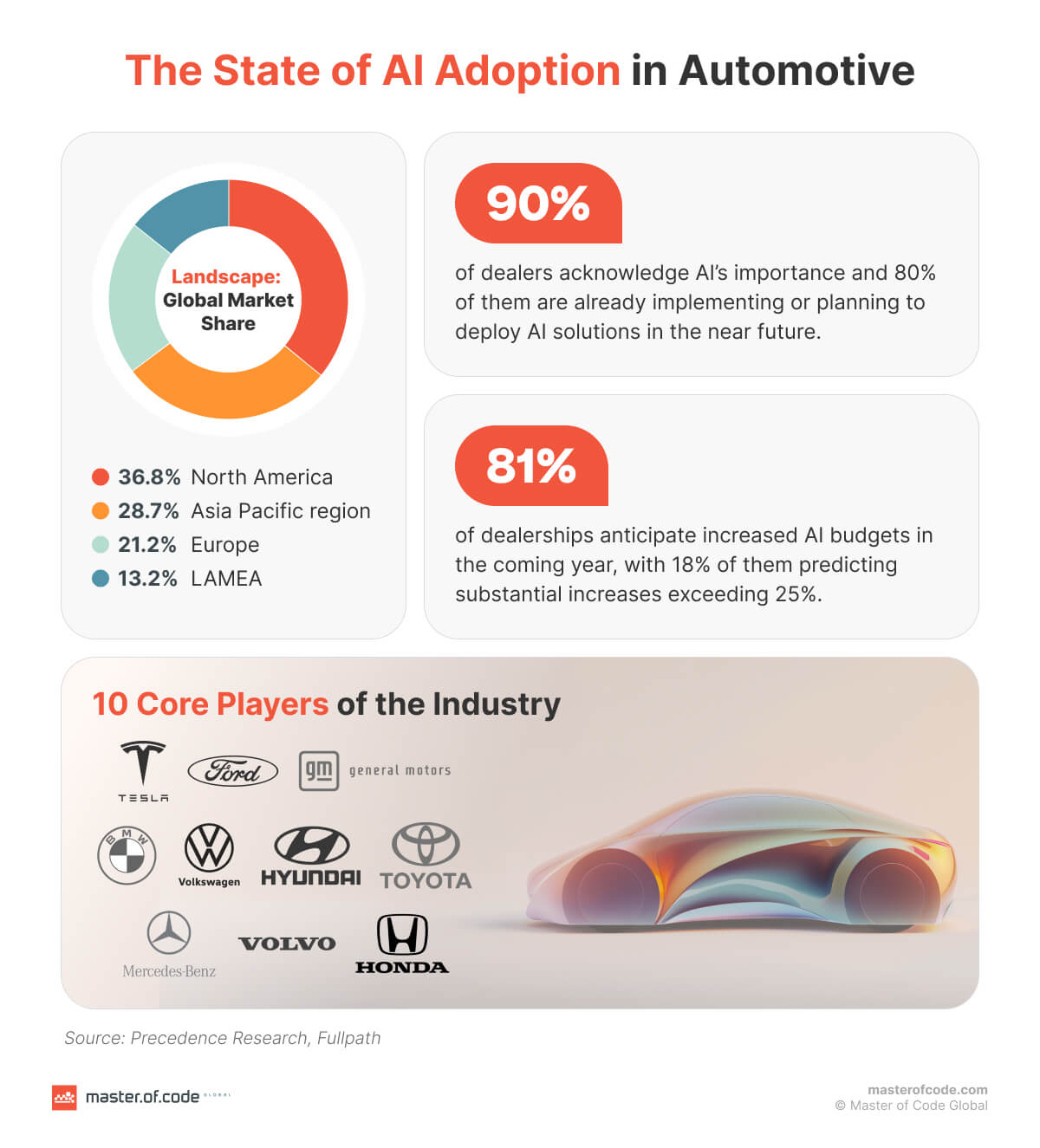
Industry challenges:
- 80% of companies, including dealerships and auto makers, are ill-prepared for logistics disruptions.
- Production line downtime costs the average factory $22,000 per minute.
- 60% of younger car buyers (under 45) prefer online purchases and contactless services.
- 48% of clients don’t remain loyal to their previous brand, making retention harder.
- Ransomware attacks in the domain have caused over $200 million in damages, up 180% since 2021.
The flip side of these bottlenecks is the opportunity created by AI. From bots that handle thousands of inquiries instantly to predictive systems that prevent costly downtime, automation is an operational necessity.
Impact of AI and automation on the industry:
- 20–30% reduction in costs and 20–50% drop in downtime through maintenance optimization.
- Failure prediction boosts equipment availability by 20%+ and cuts inspection fees by up to 25%.
- AI-driven supply chains decrease forecasting errors by 30–50% and lower inventories by 20–50%.
- Robot-human collaboration can raise productivity by up to 20%.
- It accelerates R&D effectiveness by 10–15% and reduces time to market by 10–40%.
- Smart defect detection is 90% more accurate than manual inspections, boosting quality inspection efficiency by 50%.
- Autonomous vehicles could prevent 1.24 million deaths worldwide per year and cut fuel consumption by 10%.
- Technology can help reduce CO₂ emissions by 10% and slash energy costs by 10–20%.
While pressures are mounting, artificial intelligence, starting with automotive chatbot solutions, offers practical ways to protect margins, engage buyers, and strengthen resilience. Next, let’s look at the key advantages these assistants bring across the industry.
Key Benefits of Automotive Chatbots
Purpose-built bots solve real problems. They eliminate unnecessary waiting, keep consumers engaged, and take the stress out of purchasing. Let’s break down the most important advantages.
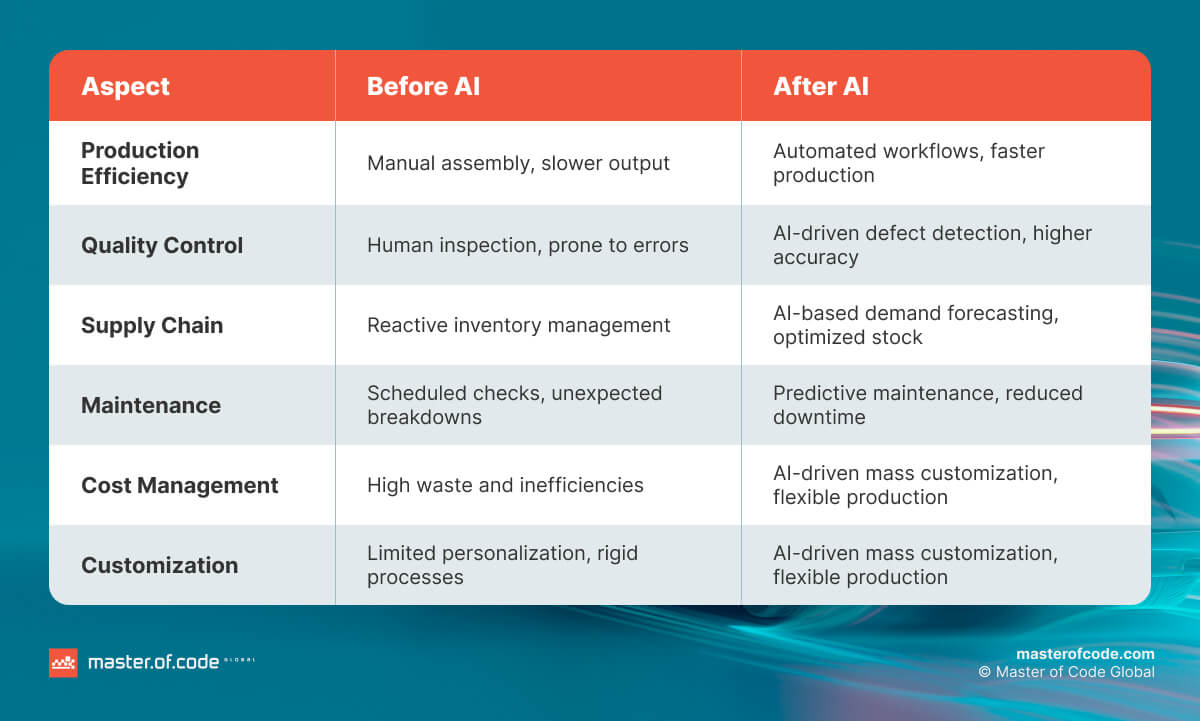
- Hassle-free customer engagement. Virtual assistants make the first interaction simple and quick. No long waits or repeated questions, just instant answers that move people closer to what they want.
- Higher sales and revenue. When buyers get fast, accurate assistance, they’re more likely to trust the brand and complete the purchase. That trust builds momentum and shows up in increased sales numbers.
- Faster buying process. From comparing cars to booking a test drive, bots guide customers through each step. The result: fewer delays and quicker decisions.
- Round-the-clock support. Unlike human teams, chatbots don’t log off. They’re available 24/7, handling queries the moment they arise.
- Lower service costs. By automating routine tasks, like appointment reminders or loan calculators, businesses cut down on repetitive work and free staff for more complex cases.
- Smarter bookings. Assistants adapt to individual needs, making service and test-drive organizing smoother and more personal.
- Stronger loyalty. Proactive notifications for maintenance, insurance, or renewals ensure clients are connected long after the sale.
- Trust and compliance. AI solutions can be designed to follow privacy rules like GDPR and CCPA. That transparency builds confidence and reassures people their data is safe.
How Different Businesses Use Chatbots
In short, chatbots in the automotive industry reduce friction at every stage: engagement, decision-making, and long-term service. Their true value, though, becomes clear when you see how different organizations use them. Let’s explore these applications next.
Car Dealerships
These businesses juggle endless buyer questions, from “Do you have this model in stock?” to “What’s my trade-in worth?” A car dealership chatbot takes on these tasks, speeding up the buying journey while delivering customers straightforward, instant answers. The benefits go beyond convenience—they directly impact trust, lead conversion, and sales.
Car Inquiry Carts
An AI chatbot for dealerships can act like a virtual shopping cart where buyers add models they’re interested in, compare side by side, and save options for later. Instead of flipping between pages or losing track of preferences, users get a structured view of their choices. For companies, this keeps clients engaged longer and reduces drop-offs during research.
Trade-In Value Estimation
A dealership AI assistant can instantly estimate a customer’s trade-in value based on current market data. Shoppers don’t have to wait days for a callback; they see realistic numbers right away. This transparency removes friction, builds credibility, and gives sales teams warmer leads who already know their budget range.
Inventory Search Recommendations
Finding the right match in a large stocklist is often the hardest part of car shopping. An auto dealer chatbot simplifies this by suggesting vehicles that fit consumers’ spending limits, mileage, and feature preferences. Customers feel guided instead of overwhelmed, while brands save time by focusing on qualified prospects who are sure of what they’re after.
Automobile Part Manufacturers
Parts suppliers turn to automotive chatbot solutions for quick, accurate answers on specifications and compatibility. This instant support reduces errors and returns, improving both customer satisfaction and efficiency.
Beyond direct interactions, Conversational AI also assist with inventory tracking by capturing shopper inquiries and preferences. These insights help manufacturers forecast demand more accurately and optimize their supply chains.
Online Car Retailers
For online sellers, dealership AI assistants make the buying journey smoother from the very first click to the final purchase. They guide shoppers through every step, offering tailored recommendations and detailed product insights that help consumers make confident choices.
These systems also handle common questions on vehicle pricing, features, and availability instantly. By doing so, they create a faster, more customer-friendly shopping experience that feels less like searching and more like being guided toward the right car.
Car Brands
AI Automotive companies use chatbots and voicebots to boost both marketing and customer service. These tools create interactive ways for brands to showcase a new vehicle, highlight key characteristics, and promote upcoming launches.
By delivering targeted information and answering questions in real time, bots help businesses build stronger market presence and closer client relationships. This kind of personalized engagement drives loyalty and keeps awareness high in a competitive space.
Car Insurance Companies
For auto insurers, AI-driven chat interfaces streamline quoting, claims, and policy details, making each step faster and more convenient. These applications also capture buyer data and inclinations, enabling firms to deliver more individualized coverage options and custom-fit advice. The result is higher trust, better perceived value, and a stress-free digital journey
Core Use Cases for Car Dealerships and Beyond
Chatbots are no longer limited to handling basic questionі. They’re supporting sales, service, and retention across the entire sector. Among the many AI use cases in automotive industry, they stand out for making complex processes simpler and more customer-friendly.
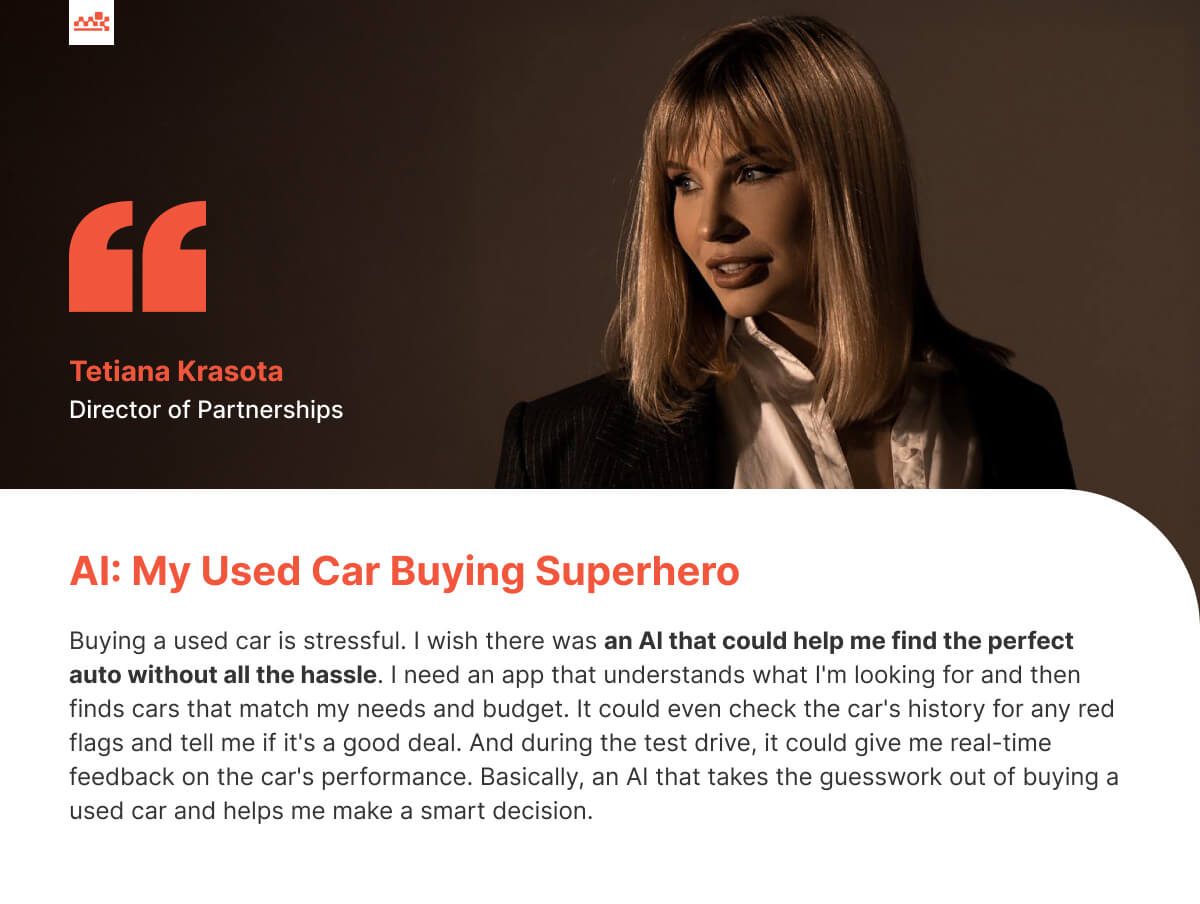
FAQs Management and User Engagement
Answering repetitive questions is one of the simplest and most valuable jobs for chat assistants. Instead of waiting on hold, customers get instant, accurate responses that keep them moving through the buying journey.
Typical questions automotive chatbots handle include:
- Pricing and financing options;
- Vehicle specifications and features;
- Maintenance schedules and service details;
- Availability of models or parts.
Beyond quick replies, these assistants also guide buyers toward the next step, whether that’s booking a test drive or requesting more details. This makes shopping feel more personal and helps turn casual inquiries into qualified leads.
Car Loan and Budget Calculation Assistance
Financing is one of the most stressful parts of buying a car. An AI bot can take the complexity out of the process by giving customers clear, instant numbers.
What automotive chatbots can calculate:
- Loan options and interest rates;
- Trade-in impact on financing;
- Estimated down payments and taxes;
- Overall monthly budget for a new vehicle.
Some solutions even offer instant financing pre-approvals, assisting clients in moving from research to commitment in just a few clicks.
Instead of filling out long forms or waiting for quotes, buyers get quick estimates tailored to their needs. This reduces stress, speeds up decisions, and helps shoppers feel confident about affordability before stepping into the dealership.
Streamlining Car Maintenance Services
Keeping automobiles in top condition is essential, but scheduling and follow-ups often frustrate owners. Intelligent interfaces simplify the entire process by automating tasks and delivering timely, customized support.
How car chatbots improve upkeep services:
- Automated bookings & reminders. Drivers can schedule appointments anytime, while bots send proactive alerts that reduce missed visits.
- Predictive monitoring with AI. By analyzing patterns, virtual assistants trigger AI-driven notifications before problems escalate, saving money on major repairs.
- Roadside assistance integration. In case of breakdowns, bots can connect motorists directly to help without lengthy calls or app navigation.
- Personalized care tips. Car chatbots share advice tailored to a vehicle’s age, mileage, or usage, helping people prevent issues between visits.
Efficient Test Drive Arrangements
Test drives remain one of the strongest conversion tools in the car-buying journey, yet arranging them often eats up valuable staff time. Automotive chatbots streamline this process by accumulating visitor details, checking availability, and securing slots instantly, removing the delays that typically frustrate everyone.
AI chatbots for dealerships go further by:
- Offering flexible scheduling around showroom hours;
- Sending reminders to reduce no-shows;
- Collecting preferences to pair drivers with the most relevant vehicles.
By introducing a car dealership chatbot into this step, businesses turn scheduling from a pain point into a selling advantage. The ease of booking builds goodwill, keeps prospects engaged, and ensures the brand doesn’t lose buyers simply because the process was too slow.
Coherent Insurance Management
Insurance policies are often packed with complex details that overwhelm clients. Automotive chatbots simplify this by breaking down coverage options, answering common questions, and guiding users through quotes or claims.
They can also handle routine updates like policy changes, renewals, or premium reminders. This reduces paperwork for insurers and gives customers faster, clearer access to their insurance information.
Optimizing the Vehicle Purchase Procedure
Closing a sale often involves multiple moving parts: delivery timelines, paperwork, trade-ins, and final confirmations. An AI-powered automotive chatbot keeps the buying process on track by instantly updating buyers on bookings, expected delivery dates, and other crucial details. No more chasing calls or emails as information flows directly to the customer in real time.
These assistants also support trade-in evaluations and act as inventory browsing tools, helping shoppers find the right automobile from available stock before signing off on the deal. This reduces uncertainty and builds confidence in their choice.
Enhancing Dealership Experience
AI for automotive dealerships is raising the standard of customer interaction by turning websites and apps into full-service knowledge centers. Instead of just browsing static pages, visitors get real-time answers that keep them engaged and informed.
How technology boosts the auto-shopping:
- Central information hub. A car dealership chatbot can provide details on pricing, offers, and financing without the need for staff involvement.
- Seamless live chat escalation. When complex questions arise, bots can instantly transfer the conversation to a human agent, ensuring buyers never feel stuck.
- Multichannel support. From WhatsApp to Messenger, AI chatbots for dealerships expand coverage across the platforms prospects already use, making communication effortless.
- Smarter lead handling. Bots qualify inquiries, redirect requests to email or phone when needed, and capture data that helps sales teams personalize their follow-ups.
Hybrid Support Strategy
AI chatbots for dealerships handle most routine tasks, from answering FAQs to booking test drives. But when questions go beyond their scope, they can seamlessly hand off the conversation to a live agent with all the chat logs. This ensures the customer doesn’t have to repeat themselves and the transition feels natural rather than disruptive.
CRM Integration and Data-Driven Personalization
When automotive chatbot solutions integrate with a CRM, every interaction adds value. The bot records buyer preferences, past conversations, and behaviors, giving sales teams a clear picture of each prospect. That data can then be used to tailor offers, highlight relevant vehicles, and suggest financing that matches individual needs.
Real-World Examples of Automotive Chatbots
AI-driven chat and voice solutions are already driving results for global auto leaders. Here is how.
Toyota’s Educational Chatbot for Marketing
Built with GPT-4 and custom training data, this tool guided users through product details and linked them to pricing and vehicle options. It boosted engagement and delivered higher clickthroughs than banner ads. It also encouraged clients to spend more time exploring products.
Feldman Automotive Group’s Sales Bot
Integrated into Facebook ads, this assistant qualified leads through Messenger chats. It reached nearly 100,000 people and drove about 50 monthly automobile deals. With clickthrough rates of 4.5–5%, it proved automation can fuel both interactions and conversions.
Alphie by BMW Group Company Alphabet
Created to manage high inquiry volumes, Alphie handled test drives and leasing questions outside business hours. It accelerated response speed and reduced staff workload, showing how AI assistants strengthen client care without adding overhead.
Mercedes-Benz’s Dealership AI Assistant
A bilingual Messenger bot allowed users to book test drives and browse the latest lineup in English or Arabic. It improved accessibility for a wider audience and gave the firm valuable insights into customer preferences.
At Master of Code Global, we’ve also created automotive chatbots that help solve real problems for clients. Here are a few standout projects.
GenAI Car Dealership Chatbot
We built a Generative AI web assistant to handle FAQs and streamline applications across 195 dealerships. It supports 14 vehicle models with 79 variations, connects buyers directly to agents, finds nearby locations, and books test drives in just a few clicks. The result: smoother site engagement, more qualified leads, and faster interactions.
AI Voice Agent for a Global Automotive Company
A large dealership network needed a way to capture prospects and support buyers without overwhelming staff. Our team rolled out a voice solution that automates test drive scheduling, answers automobile questions, and follows up after purchase. In the first two months, it delivered a 37% lift in lead conversions, 26% more bookings, and over 350 after-sales engagements.
AI-Powered Predictive Maintenance
A major parts manufacturer was losing money every month from machines breaking down without warning. We designed a system that tracks sensor data in real time and predicts issues before they cause stoppages. The result: 67% fewer breakdowns, 45% lower maintenance costs, and far more reliable production.
Future of Automotive Chatbots: 2026 Trends and Insights
What’s coming next will push existing bots far beyond simple Q&A – turning them into smart copilots for both drivers and dealerships.
Generative AI as the Brain of Automotive CX
The next interaction a client has with a car dealership chatbot won’t feel scripted. With automotive Gen AI under the hood, conversational systems can truly understand intent instead of just matching keywords. If a customer says, “My car makes a weird noise when turning left,” the bot will ask follow-up questions, recall the client’s previous vehicle details, and suggest possible causes without sounding like a repair manual.
Real-world adoption is already underway: CarMax has GPT writing their car listings, and BMW is putting this technology directly into their vehicles. The big change? Conversations that feel natural and chatbots that actually get what customers need help with.
AI Agents Blur the Line Between Staff and Software
Think of these as digital employees that never sleep, capable of supporting dozens of clients at the same time. Unlike basic chatbots that only provide answers, AI agents for automotive take real action — from scheduling service appointments and processing insurance claims to negotiating trade-in values.
By 2029, agentic AI is expected to autonomously resolve 80% of common customer service issues without human intervention, driving a 30% reduction in operational costs. The appeal is clear: they work around the clock, absorb peak demand without delays, and manage situations that once required human staff. Whether it’s 2 AM or a holiday weekend, these applications get things done quickly and efficiently.
Voice AI Becomes the New Driving Habit
Talking to the automobile is about to get much smarter. Demand for automotive voicebots is growing quickly, and it makes sense. Drivers keep their hands on the wheel while managing everything else with simple commands. Soon, a customer might say, “Book my service appointment for next Thursday morning and send the details to my calendar” or “Find me a charging station that’ll be free when I arrive.“
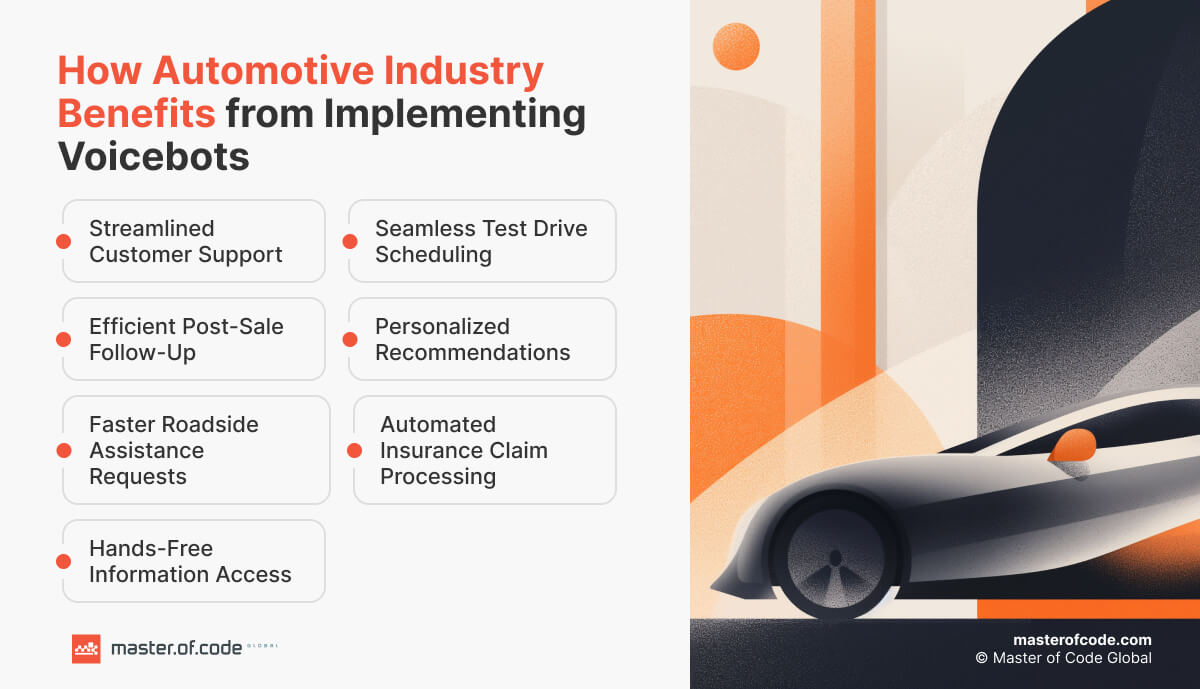
These AI-powered systems will not only recognize individual voices but also remember preferences and work seamlessly across touchpoints, whether in the car, on mobile, or through a dealership call. No wonder 76% of U.S. drivers are interested in using voice Gen AI features in their cars.
Predictive Insights Rewrite Automotive Service
Imagine a vehicle alerting its owner about potential issues before they happen. This technology monitors driving behavior, tracks vehicle health, and identifies patterns that signal upcoming problems. A chatbot might notify a client: “Your brake pads will need replacing in about three weeks based on your driving.” Or a dealer might proactively reach out because their system detected that the customer typically trades up after four years.
Instead of waiting for consumers to call with concerns, automotive companies can engage first with timely, personalized solutions. In addition, predictive AI reduces maintenance expenses by 30–40% while improving auto reliability and user satisfaction.
Personalization Becomes the Default Setting
Every interaction can feel as though it was designed specifically for the customer. The system learns whether a driver prefers quick answers or detailed explanations, remembers if they avoid early morning service appointments, and tracks recurring interests such as fuel efficiency. When a client contacts support, the assistant already has access to their vehicle history, past inquiries, and preferred communication style.
Research shows that a third of buyers would switch to a different brand if the ownership experience felt more personalized, and that’s exactly where the industry is heading. In fact, AI-powered virtual assistants and in-car infotainment systems are now present in more than 40% of new vehicles, delivering voice recognition, navigation aid, and tailored recommendations that elevate the driving.
AI as the Industry’s Fraud Watchdog
The fraud problem is getting sophisticated fast. Criminals now clone voices, forge documents, and even build entirely fictional identities that appear completely real. Traditional checks can’t spot these fakes anymore. Automotive businesses require their own AI watching for questionable activities: voice analysis that catches cloned speech, document scanners that detect forged paperwork, and behavior monitoring that flags unusual activity.
For example, Capital One recently introduced an AI-fueled tool called ProtectID, which helps auto dealers identify synthetic profiles and suspicious borrowing patterns before fraudsters drive away with a vehicle.
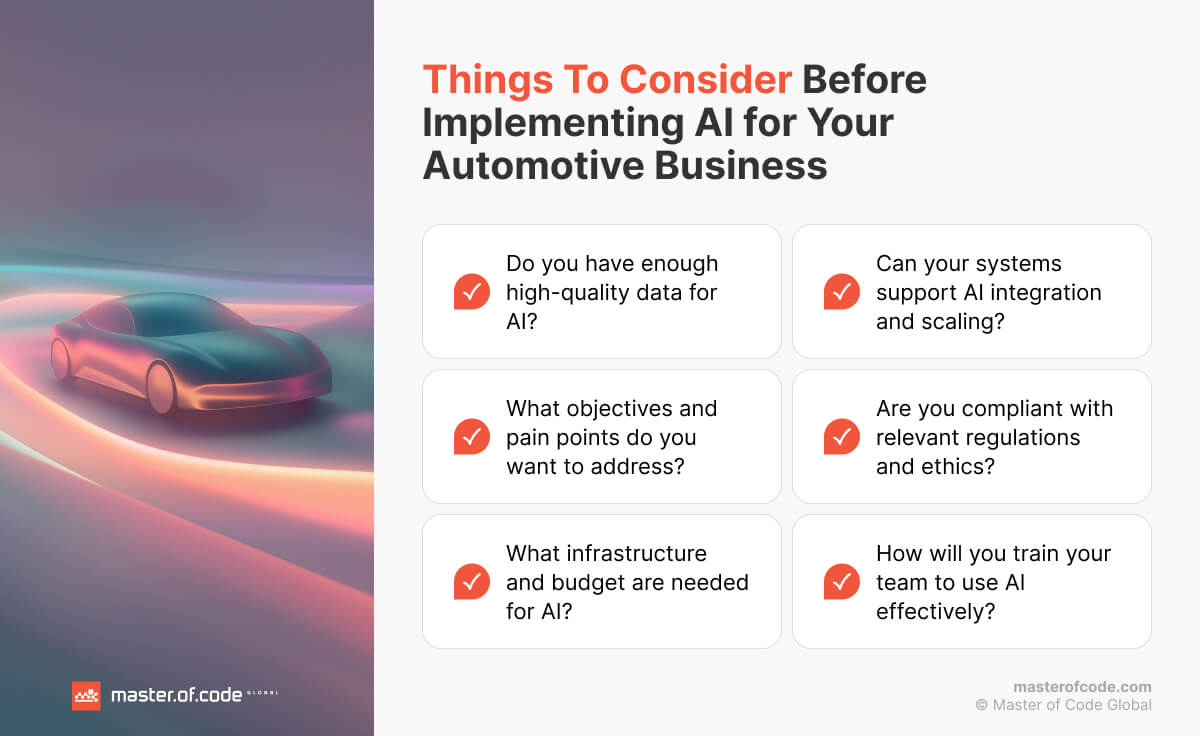
Why Now Is the Time to Adopt Automotive Chatbots
Undoubtfully, bots are central to how the industry connects with buyers. From booking test drives to supporting after-sales engagement, they keep dealerships competitive in a market where speed and personalization matter most. And when combined with technologies like predictive analytics, AI agents, or voice interfaces, virtual assistants unlock even greater impact across the customer lifecycle.
Looking ahead, automotive chatbots will continue to expand their role, not just in dealerships but across insurance, manufacturing, and aftermarket operations. Businesses that adopt them now will be able to deliver faster service, more personalized experiences, and stronger client loyalty compared to those that wait.
At Master of Code Global, we’ve delivered over 500 AI projects for brands worldwide. Our focus is simple: build solutions that prove their value fast, scale smoothly, and meet enterprise-grade standards. Whether you need a new automotive chatbot, an audit of your current setup, or a roadmap for growth, our team knows how to turn ideas into measurable results.
If you’re exploring automotive chatbots, our AI chatbot development services are built to get you there quicker, smarter, and more securely. Contact us today to start shaping your bot strategy.






